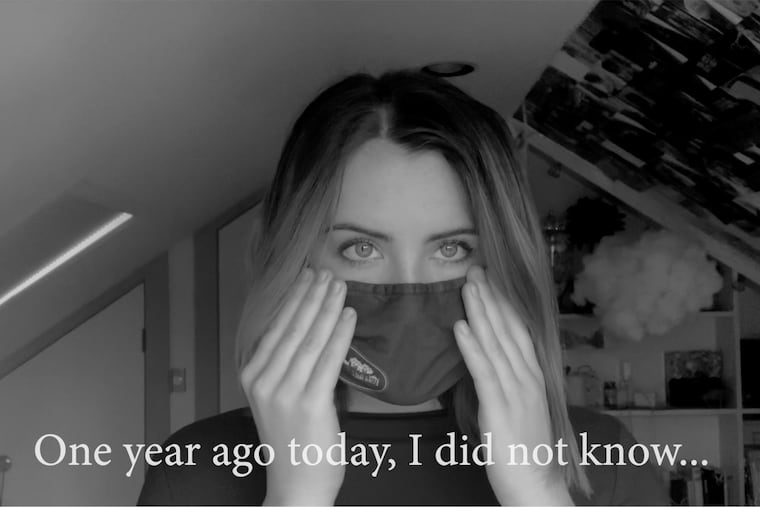Listen: Philadelphia’s choral students sing out 2020 with a quiet work that says it all
Students from choral music programs at Haverford, Bryn Mawr, and Swarthmore Colleges have made a haunting work that speaks to the isolation we've all faced.

“One year ago today, I didn’t know that …”
Some 100 student singers from three Philadelphia-area choral music programs and one in New York have completed that sentence — in ways that are unfiltered, honest, and even raw — for a new choral work that speaks to the isolation of the past year.
“I didn’t know that … I could get by with so little.”
“I would question everything.
“I would hold his hand one last time.
“I would watch my city burn.”
With their words set to music by Philadelphia composer Scott Ordway and their singing recorded individually from home, the piece, Twenty/Twenty, evolved into a soulful, black-and-white 12-minute video.
Twenty/Twenty has tallied roughly 6,000 YouTube views since its Dec. 11 release, which is more exposure than any of the participants’ choral groups — from Haverford, Bryn Mawr, and Swarthmore Colleges locally and Hamilton College in New York — had in concert before the lockdown.
The music elegantly partitions female and male voices, then urgently brings them together for the words about burning cities. Soprano high notes enter for the words “that I was in love.” Saturated harmonies buoy up “I did not know that I was strong.”
“I should’ve held you closer” is repeated several times near the end. Videos shot by the singers veer between unpopulated urban landscapes and close-ups of faces and hands.
Thousands grieving as one
“You don’t hear references to dorm rooms or class cancellations. … I gravitated toward the things they said that all of us would feel,” said composer Ordway, who teaches at Rutgers University’s Mason Gross School of the Arts. He assembled Twenty/Twenty from 1,000 video clips and 600 audio clips submitted by the choristers.
Most arresting was a statement addressing quarantine limitations on expressing grief. “(I never thought) I could want so badly to go to a funeral.”
“A number of students had a family member who was ill, and a few were sick themselves,” said Haverford/Bryn Mawr choral studies director Nathan Zullinger, who coordinated the project. “The point is more that COVID brought a halt to the rhythms of our lives — and the greater backdrop of fear was certainly affecting everyone.”
The idea for the piece germinated when the Fishtown-based Ordway and Zullinger met at a live concert in March and communicated over the lockdown months to create something for students that would be more than a poor substitute for what they typically did together in person.
“Everything felt inadequate … So many things were like marking time,” said Zullinger. “We could do something bigger, something that could be cathartic for the students, and would connect them with the outside world.”
With schools constantly shifting between in-person and remote classes, Ordway proposed the collaboration with students — plus adult choir members — having previously taken a documentary approach in pieces such as Brotherly Love that had students giving views on gun violence. Haverford, Bryn Mawr, Swarthmore, and Hamilton jointly commissioned the new work.
Using their words
The starting point was words: After Ordway set them to music, he sent out the score so students could self-record their individual parts.
Simple enough? Not really. From her home near Jacksonville, Fla., Haverford chemistry major Jordan Polster found a quiet corner underneath a staircase: “I had several tries. It’s easier to sing in person. But I would do a take, and there was a small error. … You’re always your hardest critic.”
The video element was hatched relatively late in the process. Prompts sent to the students were geared toward shots of the outside world seen from behind windows. Polster contributed the barren beach scenes near her home. Self portraits — both face and hands — were also encouraged.
The 21-year-old Haverford senior Nicholas Roland could only get a good video shot of his hands by holding his phone between his teeth. “It was nerve-racking,” said the biology major. “I’m a bit self-conscious.”
YouTube reactions have been ecstatic. Philadelphia composer Thomas Lloyd described the piece as “unflinching in facing what we’ve been in.”
Might Twenty/Twenty be a time capsule that tells future generations what the previously-unthinkable year was like? “It won’t be forgotten,” said Polster. “It will continue circulating and gaining strength as more people relate to what it is saying.”
The video can be accessed through scottordway.com.